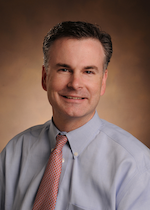Director’s Corner: Integration of Physician-Scientist Education and Training
by Christopher Williams (Vanderbilt MSTP Director)
 On Being an MSTP Director
On Being an MSTP Director
I am thrilled and honored to have been asked to serve as the director of Vanderbilt’s Medical Scientist Training Program. I certainly feel humbled to know that I am following in the footsteps of outstanding institutional leaders, including Daryl Granner (7 years), David Robertson (10 years), and Terry Dermody (12 years). While admitting my personal bias, having been a trainee, college advisor, and now Director, I do believe that this is the best Medical Scientist Training Program in the country! The strengths of the program are manyfold. However, three that leap to the forefront are as follows: the high-level institutional support providing me and my predecessors with resources allowing innovation and creativity in tailoring programming that prepares our students for careers as physician-scientists, an outstanding leadership team, and perhaps most importantly, a highly talented and accomplished student body motivated to innovate and excel. I am excited to see what the future holds for all of us!
A Bit of Background
Having grown up in Boston and attended college at Brigham Young University, I came to Vanderbilt in 1994 and graduated from the MSTP in 2002. Dr. Raymond DuBois was my Ph.D. thesis advisor, and my project centered around elucidating (or attempting to!) the mechanism(s) of action of the antitumoral properties of nonsteroidal anti-inflammatory drugs. Ray is a physician-scientist, a terrific mentor, and currently the dean of the Medical University of South Carolina. Other alumni who trained during this era, some of whom you may already know, include Kevin Niswender (’98, Medicine – Endocrinology), John Stafford (’03, Medicine – Endocrinology), and Josh Fessell (04′, Medicine – Pulmonary/Critical Care). I “short-tracked” in internal medicine at Vanderbilt as a member of the Harrison Society, a program within the Department of Medicine designed to foster physician-scientist career development during residency and fellowship. During my gastroenterology fellowship, I developed interests in the management of inflammatory bowel disease and performed a post-doctoral fellowship with Dr. Scott Hiebert in biochemistry, where I studied intestinal wound healing and repair using mouse models, a theme dominating my subsequent research activities. I joined the faculty in the Department of Medicine at Vanderbilt in 2007 as a tenure-track physician-scientist. My research program has benefited from the hard work of excellent post-doctoral fellows, MSTP students and IGP students. All have contributed to its success in innumerable ways.
Looking Forward
I am eager to continue the rich tradition of innovation that defines the Vanderbilt MSTP. Our MSTP alums are among the top in the country, a fact reflected in recent survey results indicating that 92% of respondents from last year’s graduating class matched to their first choice for residency. My past experience in directing the Harrison Society provides me with a unique perspective in assisting MSTP students in making career choices. Vanderbilt has a national reputation for excellence in training and in providing a rich environment for physician-scientist development. Innovative programs, conceptualized and implemented by Dr. Nancy Brown, Dr. Katherine Hartmann, Dr. Gordon Bernard, and Dr. Jeff Balser, have nurtured the development of many early career physician-scientists. The trainees and junior faculty participating in post-doctoral physician-scientist training (PSTP), vis-à-vis the Harrison Society and the Newman Society, are great and untapped resources for MSTP students as they reflect on and develop in their career paths. Fostering interactions between pre- and post-doctoral trainees provides valuable experiential guidance to MSTP learners. As the new academic year begins, the Student Advisory Committee will be in charge of brainstorming programming solutions that will make the most out of this connection. The benefits of this relationship to the mentees are fairly obvious: they will have a good source of guidance and advice, a network of individuals in various scientific and clinical fields, and a diversity of role models, from whose careers they can pattern their own. As future investigators leading laboratory teams, PSTP mentors will gain valuable experience mentoring trainees as they learn to provide stage-specific feedback on trainee career development, and the mentors will also gain a broader perspective on the issues trainees grapple with as they navigate their own career development. I close with a quote from Skip Brass, the MSTP Director at the University of Pennsylvania School of Medicine, “[As a Physician-Scientist] it is a luxury and pleasure to have the intellectual freedom to pursue our scientific ideas, interact with talented and thoughtful physicians and scientists across the world, and mentor the next generation of physician-scientists.”
